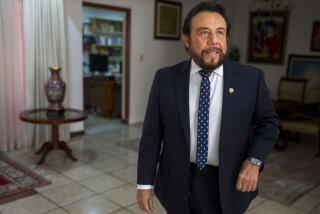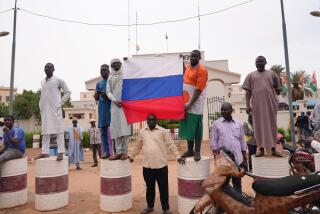Algeria Leader Pleads for Calm,Vows Reforms : Fears Nation Is at Brink of ‘Chaos and Civil War’
- Share via
ALGIERS — Appealing for calm even as the staccato of sporadic gunfire echoed in the background, President Chadli Bendjedid promised Algerians on Monday that he will introduce major political reforms in the wake of the worst riots in Algeria since its war of independence ended 26 years ago.
“I appeal to citizens everywhere. I need your help and support for the sake of your nation, your revolution and your property,” Bendjedid said in an emotional address in which he warned that Algeria, over the last week, had slipped toward the brink of “chaos and civil war.”
Scattered gunfire crackled across the darkened city as Bendjedid’s pre-recorded address was broadcast to an expectant and nervous nation.
And although Bendjedid’s speech had been awaited with much anticipation, it was not clear how it would be received, diplomats and other analysts said. Certainly it appeared to fall far short of the demands for reform and for economic relief being expressed on the streets.
Earlier, troops deployed throughout the capital since a state of siege was declared last Thursday opened fire on several thousand anti-government demonstrators trying to march toward the city center.
Witnesses said that as many as 12 people were killed in the confrontation, which occurred in Bab-el-Oued, a working-class neighborhood adjacent to the fabled old quarter known as the Casbah. Other reports put the toll at 25 or more.
Officials have released no figures, but unofficial estimates compiled from hospitals indicate that more than 200 people have been killed in a weeklong series of clashes, most of them in Algiers.
No Comment on Casualties
Military authorities have refused to comment on the casualty reports, but the urgent wail of sirens shattered what had started out as a normal day Monday as ambulances careened through the downtown streets. Army helicopters armed with tear-gas rockets circled overhead, swooping low like giant steel birds of prey as they passed over the city.
Monday’s violence was much smaller in scale and more easily contained than the rioting that began last Tuesday and spread throughout the capital and to several other Algerian towns and cities before the army was called in Thursday.
Most of the city remained calm throughout the day and, apart from occasional bursts of gunfire, the quarter around the Casbah returned to normal by nightfall, when a curfew went into effect.
Frustration Lingers
Still, the fact that calm has not been entirely restored to this hilltop city of 3 million people despite the intimidating presence of troops, tanks and armored personnel carriers suggested that the anger and frustration that erupted last week are not completely spent.
On the contrary, there was an air of tension throughout the city, and especially in the poorer quarters, where large groups of young and unemployed men sat sullenly in tea rooms or loitered on street corners, occasionally exchanging nervous glances with the soldiers.
Unemployment among these youths, who account for a large majority of Algeria’s 23 million people, is estimated to be higher than 40% in urban areas such as Algiers. Their frustrations, compounded by a tough government austerity program that has precipitated a sharp decline in living standards over the past year, is seen as the major cause of the latest unrest.
Fundamentalist Overtones
However, the violence has also taken on the overtones of Islamic fundamentalism, with a new and largely religious leadership emerging from the shadows of Algerian politics to exert a modest--but so far surprisingly effective--degree of control over the protests.
Monday’s demonstrations, like several others over the weekend, seemed to be largely inspired by the fundamentalists.
A heretofore unheard-of group, the Movement for Social Renewal, has issued several clandestine communiques over the last few days demanding economic and social reforms from the socialist government.
At least twice in the last four days, it has fielded groups of protesters several thousand strong to march in defiance of a military ban on street demonstrations.
5,000 Attempt March
On Monday, an estimated 5,000 protesters, many of them wearing the white robes of the fundamentalists, tried to march from an eastern suburb of Algiers to the city center following afternoon prayers.
They were quickly dispersed by soldiers firing into the air, but they regrouped in the afternoon near the Casbah, where a more serious clash ensued.
Witnesses said troops fired on the demonstrators when they refused orders to disperse. The area was quickly cordoned off, and several reporters who tried to get close to the protests were detained. But the crackle of gunfire and a plume of dark smoke spiraling upward from the outskirts of the Casbah attested to the clashes taking place inside.
It was unclear whether the fundamentalists, who have clashed with Bendjedid’s socialist administration in the past, will gain the stronger voice they have been seeking through their attempts at leadership of the unrest.
Bendjedid, whose continued tenure in office has been called into serious question by the rioting, appealed to Algerians not to destroy “what we built with our blood” and to refrain from further acts of “chaos and destruction,” which, he warned, had brought the country to the brink of “disaster.”
Defends Austerity Moves
He defended his austerity measures as necessary to the country’s economic survival and promised that other serious political reforms “will be introduced very shortly.”
“I promise that we will respect the will of the Algerian people in their desire for political changes in their widest sense,” Bendjedid said.
However, the president, gesturing forcefully at times, did not outline the reforms and was vague about when they would be introduced.
Bendjedid said he deeply regretted the “human and material losses” caused by the riots and by what he said was the “difficult and painful decision” to send the army into the city to restore order.
Whether the protests are now over may depend in large measure on how Algerians react over the next few days to the president’s impassioned but vague vow to implement further reforms.
Entrenched Leftists
Another unknown factor at this point is whether Bendjedid can move quickly enough to satisfy the public with reforms that are likely to threaten entrenched leftist elements in the government, the ruling National Liberation Front and the army.
Opposition to the president’s economic reforms exists in all three power centers, with the army assuming an even more pivotal role now that it has been called upon to restore law and order.
In a major address Sept. 19, the president assailed unnamed officials who he said were selfishly resisting his efforts at economic reforms. But opposition in the three power centers, according to diplomatic sources, may also spring from true ideological differences with the regime, with aging leaders charging that economic liberalization would be a betrayal of the socialism that Algeria has embraced since winning independence from France.
More to Read
Sign up for Essential California
The most important California stories and recommendations in your inbox every morning.
You may occasionally receive promotional content from the Los Angeles Times.













